TOM FRANCIS
REGRETS THIS ALREADY
Hello! I'm Tom. I'm a game designer, writer, and programmer on Gunpoint, Heat Signature, and Tactical Breach Wizards. Here's some more info on all the games I've worked on, here are the videos I make on YouTube, and here are two short stories I wrote for the Machine of Death collections.
Theme
By me. Uses Adaptive Images by Matt Wilcox.
Search
Not The Finale Post
I have so many season finales to watch now, it’s like the end of the world. The only one I’ve seen so far is Heroes, which I will refrain from commenting on here until I’ve thought of a better way to deal with the spoilers problem.
This is why this is not the post about season finales. Instead, it is about these things:
Pirates of the Caribbean 3: Dead Man’s World Of End-Sparrow. In one of those things that didn’t really happen to me much when I worked in a warehouse building skateboards, I was taken to a preview screening of this on Wednesday in a stretch limo with free champagne, which I did my level best to pour on the editor of Disney Girl magazine. It is, I thought, ‘okay’. I would stretch to ‘quite good’ if this was the first one, but it lacks so much of the fun of the second that I find it hard to recommend. Particularly since everyone hated the second.
The first one was the zombie pirates one, and was good because it was breezier and funnier than you expected. The second was the fish pirates one and was great for its absurdly long, wildly overdone, bloody-minded physics-driven set pieces on gorgeous tropical islands. The third is about a big book of rules and some crabs that look like rocks.
None of them make a whole lot of sense, and I don’t recall what actually happened, plot-wise, in any of them (at the start of 3, everyone is alive and roaming around, so I assume nothing of import happened in the last two). But the third one doesn’t use its license to be absurd to do anything very fun. All the spectacular bits are just ship battles, which we’ve seen in some depth before.

I actually love ship battles, but they can’t hold my attention for long in dumb films. The reason they’re exciting is that they’re so physical – you can see the cannonballs, you can see which bits of the ships they smash, the damage is all evident and so the outcome is believable. In dumb films, such as this one, captains are idiots and the hero’s ship wins because it’s made of magic.
At one point a billion-strong armada retreat from two enemy ships, because they destroyed the flagship (because, for no reason, the captain couldn’t decide whether to fire or not). John, who loved it, argues that this is normal film logic, but the whole setup for the scene is “They can take this guy, but what do they do about the billion ships?” It’s hard to enjoy a dumb film about naval combat, politics and trickery if you’ve ever seen Hornblower, which was eight non-dumb films about naval combat, politics and trickery, with characters it is possible – nay, easy – to like.
Aside: Geoffrey Rush is still such a watchable pirate. While Depp’s drunken eyebrow-work on Sparrow gets tiresome, Rush can still just say “Arr” or a sentence of the form “X be Y”, and I am immediately happy.
Score: okay.

The reaction to my Galactic Civilizations 2 War Diary: which has been surreal. This is a ten-thousand word account of a single match of an expansion pack to a little-known turn-based strategy game with poor graphics, and no-one seems to mind. It’s not the hits or links that it got, surprising as they were, but the extraordinary comments. I just read someone saying- well, I’ll quote: “My brother and I would read the blog, then get together to discuss what he was doing right, what he was doing wrong, and what he needed to do to win.” This makes me feel amazing.
I like very much that I work on a magazine where I’m allowed to give stupid ideas like this a try. I did most of it at home or after work, but only because I love writing this kind of stuff so much. I had some New Years Objectives this year, one of which was to write something that got the same kind of reaction as my report on the Eve Online assassins – which has always frustrated me by being better-received than almost everything I’ve written since. This got a different kind of reaction altogether.
Comments at PC Gamer
Comments at Joystiq
Comments at the GalCiv site
Comments at Kotaku
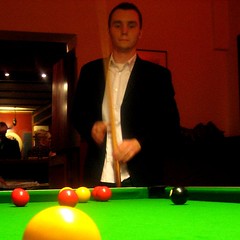
Facebook: it’s like social networking, except that I like it. I’m on everything – MySpace, LiveJournal, Blogger, Twitter, WordPress, Technorati, Tumblr, Flickr, Last.fm – but Facebook is the only one that seems really smartly designed in terms of how it connects you to people. It’s good at knowing what you’ll find interesting about what your friends are up to (almost anything), so the main news feed you get from it is incredibly fast-flowing and rich in interesting goings-on.
Now I have to watch TV.
Aaaaaaaaaaaaaa-
Sorry for two loud-noise video-link posts in a row, but that’s the freakiest thing ever. It’s the Fingerposer planned for the next version of Gmod. ON BROKEN DRUGS.
I’ve just cycled home from losing at badminton with Clare, there’s a spectacular sunset in Bath tonight that actually makes me wish I’d just stayed in town to watch it, I have two jumpy and bizarre new tracks from Fluxblog, it’s still light at quarter past nine, I have masses of good food to cook and my favourite kind of writing to do, and there are lots of interesting things happening in the next two weeks. A few things suck, but I choose not to dwell on them on a night like this.
Mystery Trip
I’ve been away the last few days. It feels like about a year and a half. I’d forgotten what it felt like to be home. I caught up with the London crew the night before my flight, and then with a load of old high-school friends the day I got back (yesterday? Could it be yesterday? I feel like I’ve been home for five weeks). I’ve sort of retro-actively photoblogged it in the Flickr set. It’s this kind of thing:
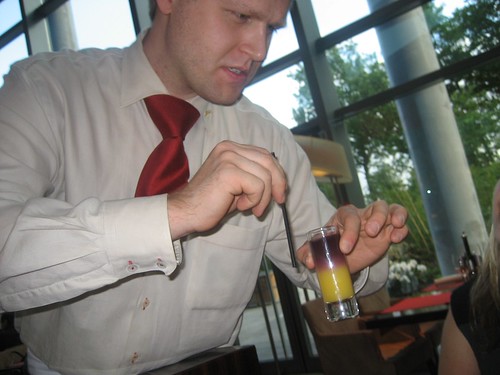
The waiter brought us two of these before what we ordered, insisting that we try them. You have to pull the straw up through the drink as you sip, so that the intake is half and half (assuming constant suction).
It was good. I asked him, after my first sip, what it was. He said it was a trade secret. I took another sip.
"Is it red wine and orange juice?"
"… yes."
Back!
Since last we spoke, I have been:
To Seattle!
In America, I am treated like a king. People keep telling me how good I look, how great I am, starting conversations with me in the street, or actually giving me stuff. That last one was because they worked at the company who’d invited me there, but even they gave me more than I’ve ever heard of them giving anyone, including something they’ve never given anyone before, and informed me that this was because I was their favourite. I don’t know what it is, a lot of these things happen before they’ve even heard my spectacularly quaint English accent.
Shavin’ Like A Man!
No room for my clippers in my luggage and no time to shave before leaving, and haunted by this strange curse that seems to mean I spend all press trips absurdly dishevelled and hairy-looking (and without notepad – another curse I managed to break this time), I bought the cheapest way to shave I could: a razor. I’d been meaning to try this, but a few things have always put me off it a bit. Bear in mind that my only experience of razor-shaving is what I see on screens, and there are only two types of scene involving them:
Scene A – a sparkling blue-tiled bathroom, morning. A beautiful woman is visible in the bedroom beyond.
A magnificently buff, bare-chested middle-aged man shaves manlily, then winces and touches his cheek.
Man: Ow, it burns!
VO: You need: Nivea For Girlymen Soft Kitten Gel For Ultra-Sensitive Weak Babyskin!
Scene B – a dingy motel bathroom, morning. A beautiful hooker is visible in the bedroom beyond.
A magnificently buff, bare-chested middle-aged man shaves very, very, carefuly, and slices his whole fucking cheek open. The cut, or bloodstain resulting from the cut, will be misinterpreted later in the film.
In other words, it seems to be excruciatingly painful and almost guaranteed to result in mutilation. Nevertheless, I bought an extremely cheap razor and no after-shave soothing product, inwardly asking how bad it could really be, despite the result of all previous internal “How X can it be?” questions having ultimately been answered by reality with “Fucking, fucking”. *
* I’m partly stealing this line from Boss Nonnu, because he stole my game.
Turned out it was fine. In fact, much easier and more pleasant than electrical shavers, as far as I recall actually using one to try to remove stubble. In general I’m not the kind of adult male who’s still trying to eradicate any evidence that he’s ever grown a facial hair in his life, and therefore must be under the age of fourteen and have his whole life ahead of him. So I’m not scraping the bejesus out of my skin, but still.
Getting A New Bike!
This one, but with slicks, which I’m informed are tyres that go fast on roads. I can now verify that they do.
I stuck it to the bike thieves of Bath by leaving my old one unlocked in town until it vanished. Ha! How’d you like that one, velo-vultures? Not much fun to ride, is it? No salvagable parts, are there? Probably fell off, didn’t you? Yeah, that’s because it’s broken. I mock the socio-economic circumstances that have driven you to unlawfully take possession of my reject! Hm. Now I feel kind of bad. But I’m still pretty sure you’re not the good guy here.
The bicycle is the best vehicle mankind has invented so far. Lots of others can do things it can’t, but those need irreplacable fuels to noisily drink and messily belch out, and the whole energy equation with them is just short-sighted and ugly. A bike is just a dramatically more efficient form of human movement, an outright improvement on the most fundamental thing our bodies do. It uses nothing, requires nothing and emits nothing. It’s also a little like flying on land, which is pleasant.
At A Stag Party!
This one is not what those in the truth business call ‘true’. Al, the groom, is, like me, not the type for stag nights. So he came to my place for fancy burgers and homemade chips, then to town with others for moderate drunkenness, then the next day for a Thai meal at the only one of Bath’s seven Thai restaurants whose location I’d forgotten, then to the park for close-quarters frisbee. EXTREME.
It was good. We ship out to his wedding soon, but I have a metric Christload of work to do before then, so I’m trying not to think too far ahead.
Losing My Internet Connection!
This router has never worked very reliably for me, so I borrowed a new one from Jonty to try. I couldn’t get my PC – or three others – to see it, so I went back to the old one. That no longer worked at all.
Fixing My Internet Connection!
Which is why and how I am talking to you now and not sooner, unless you are one of the people to whom I have spoken to sooner, in which case that happened.
I Don’t Know About You Folks
I’m ill, in the way where nothing seems real. I’m not sure what to do about it, because I was already doing everything I normally do to recover from illness when I became ill – in fact, the former followed from the latter so directly that it’s hard not to assume they’re causally connected. I’m getting more sleep than at any point in the last five years, getting more than my RDA of every vitamin known to man, eating actual food more than twice a day, and keeping warm at all times – not hard because it’s unseasonably warm anyway. I’m at a loss, body. What do you want from me?
I hate getting more than seven hours’ sleep, too. Apart from giving up a chunk of precious consciousness-time, and waking up more tired than if I’d had four hours, my brain spends all its REM-sleep time trying to think of the worst possible things that could happen, then informing me very vividly that they all have. Last night I got cancer, and had huge, dark lesions all over my face, then I was attacked by spiders. Thanks, brain! That was a fun nine hours! The physical tortures are actually the highlights: the rest of the time my subconscious invents new mental and emotional traumas, and these are much, much less enjoyable than being repeatedly stabbed then flayed.
Being ill doesn’t make the nightmares any worse, but the groggy detachment from reailty makes them harder to shake in the land of the conscious. It wasn’t until I dressed this morning and caught a glimpse of myself in the mirror that I realised I wasn’t mutilated and terminally ill. Anyway, all that is by way of explaining why this has lain dormant all week; I don’t like wasting your brainspace with this stuff and it’s hard to concentrate on anything else. Instead, now that I’ve done so anyway, I’ll append a less gloomy note to compensate.
(A Man’s Gotta Know His Limitations) Briggs, from the new Robyn Hitchcock album, is wonderful, and would be even if I didn’t have a thing for short-titled songs with massive parentheses. It talks about “Riding in [Briggs’] car in San Fransisco” and later addresses a girl called Mel, all of which sounded very specific and not the kind of thing you make up for rhymes, to me, so I decided the song must have an interesting origin in someone Hitchcock knew. I was a imagining a couple, Briggs and Mel, the former hot-tempered but well-meaning, the latter confused and isolated by his erratic behaviour. It turns out I may have been over-romanticising a little: Briggs is the villain in Magnum Force, a Dirty Harry film Hitchcock kept catching half of on TV.
He doesn’t particularly like the film, it’s presumably just the kind of thing that creeps into your head when song-writing. “A man’s gotta know his limitations” is Clint Eastwood’s catch-phrase in it, and the next line in the song “Or else he will just explode” refers to the final scene, in which Briggs – a corrupt official – is killed by a car-bomb Eastwood planted. For some reason Clint then utters his catch-phrase, although it’s not clear which limitation Briggs should have been aware of: inability to detect car-bombs? I haven’t seen the film, so I still don’t know who Mel is. Other songs inspired by films the songwriter doesn’t really care one way or the other about: one of Miss Black America’s, I think it’s Infinite Chinese Box. Apparently the guy was watching a film, then suddenly decided to stop and write a song about how he thought it was going to end, instead of watching it to find out. I applaud this kind of behaviour.
A Couple Of Things!
- I’m in one of those swamp months, where everything seems to take five times longer than it ever possibly could, and usually go dramatically wrong at three different points. This is why I was in the office until nine tonight, despite working on a section for the issue after the one whose deadline the others were crunching to. Also there was free junk food and liquor, by way of Ross’s efficient repurposing of the bribes we receive to incentivise and energise overtimers.
- The one thing that did go swiftly and without hitches was a short story I wrote to submit to the Machine Of Death collection, a set of short stories based around the concept put forth in this comic:
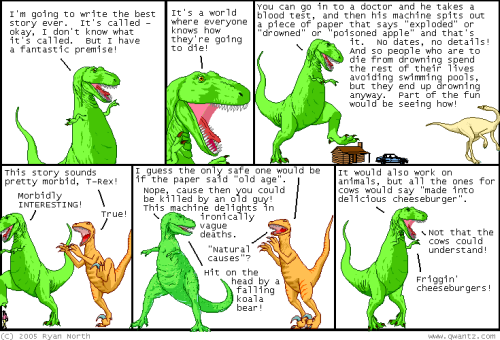
I’m going to put it up here in a day or two, once I’ve tinkered with it a bit. It’s a little over six-thousand words, divided into five short chapters, and covering a lot more time and events than my 50,000 word novel was ever going to. I’m not trying anything of book-length again until I’ve done a few more of these – it’s gratifying and intoxicating to fly through something like this without sweating it. I’m not keen to go back to a vast mess of ideas without enough narrative string to tie them together, no matter how I re-squish them.
- Lastly, Heroes was excellent. I hope they don’t do too many of these single-story episodes or it could become Lost (there is not a scale by which I could measure how little I cared about anyone or anything in the last episode of that), but Glasses Guy is one of the few characters who can carry one with ease. The actor has always been superb, taking a very tough role to make interesting and managing to give him an uneasy mix of creepiness, likeability and mystique. All while wearing horn-rimmed glasses. He’s even better without them, though, and he’s convincing enough as both a loving father and a demon that even towards the end, you’re not 100% sure which side he’s going to come down on. And ultimately it’s the one you believed in slightly more, which is itself a feat. Not just to act each well, but to know exactly how well you’re doing it and stop short of perfection on the one your character’s heart wouldn’t quite be in. 24, Lost and Studio 60 are all losing it at the moment, I’m so pleased to see the most flawed show of the lot outshining them all.
This Is Taking Ages
I had to explain the internet to someone once, not in terms of how it worked, but in terms of what it does when you start your browser. Which is, of course, nothing. You can’t even really browse it – there’s no grand index, no logical categories and no overview. It’s a derranged oracle that refuses to answer some of your most basic questions and overwhelms you with depth and insight on the most trivial ones, and the only way to tell between the two types is- actually, I haven’t found it yet. I thought at the time that this person’s expectations of the net were funny – to just start it up and have it come to them – but in fact that’s almost exactly how it works now.
I tend to jump on bandwagons as soon as Google starts driving them – search never made much sense to me with Alta Vista, Hotmail was – still is – a mockery of real e-mail, chat feels clunky and irritating in a separate application, and it wasn’t until I tried Google Reader that it clicked, and I suddenly saw the point of RSS feeds. And every one of these is now poured down my brain-gullet (eyes, I guess?) when I start my browser: they’re all part of Gmail. Communication – both realtime and turn-based – takes place entirely on that single page, the things I want to read are delivered to my pigeonhole, and anything else I need can be typed into that little white box.
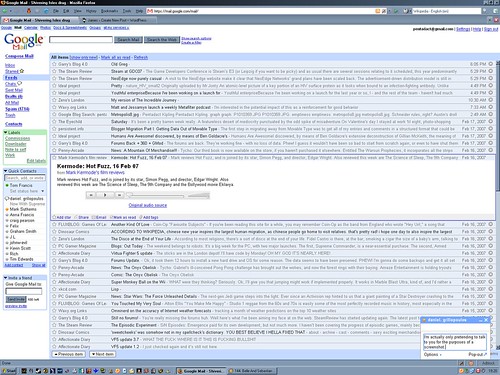
The feed-reader integration is actually a hack, but it’s one made by a Google engineer who works on Reader, so it’s a fair functional facsimile of something they evidently want to do soon. Soon too, I’m sure, there’ll be a box underneath Labels there that tells me what I’ve got going on today and tomorrow according to Google Calendar, my next most-used site. And the Compose link won’t be restricted to writing e-mails, I’ll be using the full in-browser word processor Google Docs already provides, with revision histories, collaboration options and exporting to other formats. In other words, the dense, juicy Google particles of the internet universe have given it just enough total mass to suck it all back together into one time-dilating Big Crunch, rather than expanding endlessly and hopelessly from its explosive beginning. For people like me, at least.
The other big change since I was asked that question is piracy going mainstream. When a popular movie/TV/game pirating site Iso Hunt went down for a few weeks recently, the diverted traffic to the other main sites – the ones that sprung up from Suprnova’s grave – pushed three of them into Alexa’s hallowed list of the 200 most-visited sites on the planet. Publishing companies were disastrously, fatally slow to grab hold of these new thicker cables and plug them into their content-factories, and now a handful of geeks have beaten them to it just out of boredom, just for fun, just because it’s that easy.
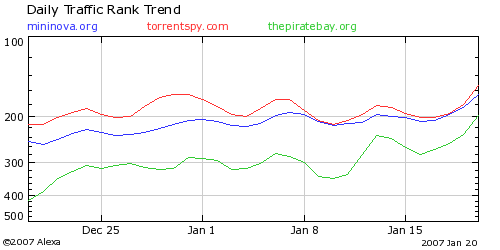
With piracy as popular as it is, it’s starting to sound naive to claim that publishers could have prevented this by selling their stuff digitally sooner. And it’s probably true that a big chunk of pirates will just keep on piratin’ long after the stuff they’re downloading is available through legitimate channels for a small fee. But the step up from getting something for free to paying for it is far, far harder to take than the next step along the expensive high-road you’re already on, even once you spot a free one below. Put more simply, morals are easier to stick to than develop. If legitimate channels had been available before illegal but free ones became well known, the critical mass of the consumer populace would have stuck with the safe, successful method they’d already had so many positive experiences through. Virtually no-one goes from working for a living to mugging people by choice, but if mugging was the only way anyone had ever acquired money, you’d have a hell of a time persuading anyone to work. What’s the term for this? An asymmetrically resistant semi-permeable social barrier? Okay, well, it should be.
The point, which I’m only just now discovering I had, is that the pirates have won so hard that this age in which every non-physical thing is free to anyone with broadband and weak moral fibre might be here for a long, long time to come. And the end to it might not come in the form of a poorly-engineered official equivalent that costs infinitely more.
We’ve been in the Information Age for thirty years now, and I’m starting to feel like it has more in common with the Iron Age than the Industrial one. We think we’ve intentionally developed a more advanced kind of machine, and we have, but the really significant thing is that through it, we’ve discovered a new raw material. What we do with that will determine what the next age gets called. Metals were originally used for weapons – killing things – then eventually we turned them into machines that produced stuff; industry. Data has so far been primarily used for communication – shouting louder to each other – but I’m sure we’re going to find something far less primitve, far more complex and far more powerful to do with it in my lifetime.
Best Interview Ever
This is a helmet-cam video of a guy falling from 12,000ft without a working parachute, and hitting the ground at eighty miles per hour.
Friend: Are you okay?
Skydiver: No.
Friend: Does it hurt anywhere?
Skydiver: Yes.
It is, obviously, an extraordinary video, and I have already linked it in my Del.icio.us panel on the right there, and am talking about it now to Graham, but somehow that exchange is the best bit.
Highlight Of 2006
I like Wired. Working for a magazine you believe in, and having some influence in it, makes you a terrible magazine critic – you tend to regard other publications with a mixture of distaste and pity at how sadly unlike your own they are. That would be my verdict in almost every review if I reviewed magazines: 30%, “Sadly unlike PC Gamer”. But I like Wired. It seems to know my stereotype well – I’m not sure myself what my broader interests are, but if there’s a piece on it in Wired, it tends to be one of them. Malaysia’s national obsession with record-breaking. The guy who runs for days at a time without sleep, orders takeaway pizza to cities he’s about to pass through to scarf it on the go, and crazy-glues over his burst blisters to keep moving.
Wow, that was barely relevant. I was just leading into the fact that this one was a party held by Wired and you got this whole thing about mag snobbery and blisters.
This one was the Wired party after the first day of E3, which is sort of a game-journo Triathelon. I’d already been hugged for something I’d written that day, fallen in love with an American PR girl on the basis of a single conversation, and seen around forty-five unreleased games including the gapingly exciting successor to one of my favourites of all time, System Shock 2. Is it geeky that that one’s up there with the other two? Wait, relevance. I also hadn’t eaten all day, but my taste for food, breaks or rest seems to evapourate when there isn’t time for them. I’m a lot like Jack Bauer, in that and virtually every other respect.
Ben Schroeder from Edge was there, and as we sipped something pink and free, he pointed out to me that one of the guys at the table over there with Will Wright was Robin Williams. Will Wright I knew would be there, since there was a Spore presentation later, and his celebrity factor was slightly diminished by the fact that I’d already interviewed him twice that day alone, but Mork himself made it kind of a tough table to go up to and say “Hi, is this seat taken?” Tougher still, all the seats were taken.

Happily I didn’t have to. I was able to accost him on his way to the bar (a few weeks after meeting me he was re-admitted to rehab for alcohol addiction, but I feel like I tried my best) and exercise the most basic human right of all: the right to talk to a celebrity without needing any pretext, association with them or even anything particularly to say. They’re public domain, we can use them as we please. I’m going to be sending a link to this post to pretty much everyone who bullied me in primary school, and it’s especially for their benefit that I’m about to recount what Robin Williams said to me when I introduced myself. “Hi, I’m Tom, I’m from PC Gamer,” I said.
“Oh, great!” he said.
See it? Because I can paste it again if necessary. It was “Oh, great!” I can use a bigger font if you like. I have that power.
It was just a little undermined by the fact that my next words were “Oh come on, don’t pretend you’ve heard of us.” He explained that really he was just glad to meet a fellow gamer, evidently considering me a more kindred spirit than the many generic tech guys, multi-platform journalists and CEOs around us. He’s a big Battlefield 2 fan, and plays as a sniper. Had he seen the then-unreleased sequel? He had, and thought it was great. What did he think of Spore? He thought it was the logical conclusion of the lineage of God games started with Populous, and extremely exciting for that.
For some reason I decided to steer the conversation toward the broader social impact of games, and possibly kids, because more or less the only thing I knew about Robin Williams was that the reason he started doing horror films after all that family comedy was because his kids were finally old enough to watch them, and he just wanted to make movies his kids could watch. This was a mistake. He started his answer with enthusiastic agreement to my hypothesis that Spore would make a great learning tool for kids, combining as it did science, silliness and a sense of wonderment at the universe, but then he wouldn’t shut up.
That sounds rude, but I don’t know if you’ve ever heard him free-associate: it’s a hard thread to follow. I tried to concentrate on what he was saying, but once he veered off topic he didn’t stick to his new topic long enough for me to work out what it was, he just kept on veering. At some point I found myself thinking “This is ridiculous, I’m interviewing Robin Williams and I’m honestly not listening to a word he’s saying.” The man is mad, and possibly quite drunk. Luckily he also doesn’t stop talking long enough to discover that you have nothing to say because you can’t remember anything he was talking about, so when he did wind down I think I just said “Excellent, well, thanks.” and left it at that.
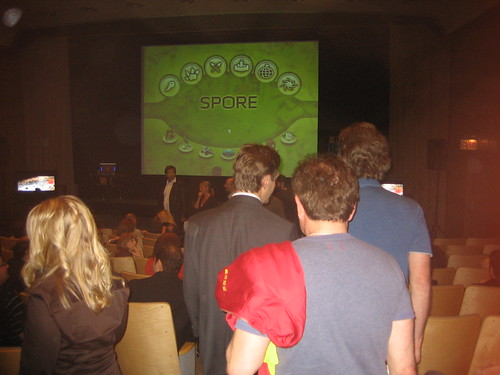
I hit the booze pretty hard then, but the presentation started soon after. I’ve now seen it enough times now to feel a bit like a Will Wright groupie, comparing setlists from previous shows; that night we got the babyfication algorithm, but not as much on deep space travel. Then – and anyone who read gameblogs at the time will be have seen this plot point coming – Will said he wanted to demonstrate how easy the game’s editors are to use by getting a member of the audience to try them. He said that ideally he’d like someone with some experience playing an alien. My close personal friend Robin Williams bravely volunteered.
Yahoo’s Kev Cheng evidently had a camera with more free memory than mine.
My favourite part of his mostly excellent adlibbed stuff was the Jewish hands of uncertainty. During the presentation Ben and I got talking to a Wired writer whose hair was two different colours, who was also hugely impressed to learn that I was from PC Gamer, although it was again undermined; this time by him being completely floored that Ben was from Edge, his favourite magazine in the world. I could have taught this guy a little something about mag snobbery. He was nevertheless an extremely nice guy, and it was via his T-shirt (whose design I do not recall) that we got talking to the girls in front, who were film-makers there on behalf of some kind of… political… local… thing? Paper? I remember imagining something like a more radical Village Voice for LA, but I was pretty drunk and I know very little, about anything really.

I interviewed Will Wright again after the presentation, pointlessly. After about ten or twenty questions, you just want to prod him and tell him to “Say more cool stuff!” He clearly has no shortage of it, and in his nasal stammering way, he’s remarkably articulate at getting it across. Usually you pitch questions to edify murky areas of your understanding of a game, but with Spore you quickly learn that the most exciting complexities of it come from things you thought you knew, but were wrong about. I thought most of the universe would be computer-generated when you first played the game, and only mentioned this as a prelude to a better question, but he corrected me to say that the editors will be released long before the game, as a demo, and the creatures, buildings and vehicles people design with them will discreetly build up in a central database so that there’s a huge backlog of user-made content at launch. It’s possible that his absurd cleverness and absurd wealth are somehow related.
Back at the party I ran into my other close personal friend Mark Wallace, an American journo who writes on occasion for the New Yorker and the New York Times, and, once, the best magazine of all: PC Gamer UK. I’d never met him before, and barely did here, but he was extremely nice, and had as it turned out been half-recognised me when I half-recognised him earlier. Mark got this blog a huge influx of readers when he linked it at the same time as scans of Murder Incorporated, my piece about the Eve Online assassins that also got me the hug that day.
I lost Ben at some point, and ended up talking to the film-makers long after the other people from my hotel had shared a lift back. They were sisters, it turns out – a writer/director and a producer – and I cannot for the life of me remember what they were working on. We – I, they and a group of friends who would later turn out to be Persuasive Games – eventually moved on to The Standard in a car far too small for that many of us, where they knew how to mix a goddamn Caucasian. I say that like that was the reason, it wasn’t. I’m not sure what the reason was, but I can tell you that the other LA Standard, on Sunset, keeps a live woman with a laptop in a class cage behind reception. She just gets on with e-mail and stuff.
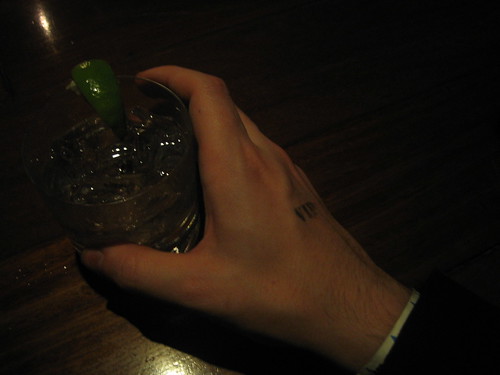
I also met – and I honestly don’t remember this, I’m just reading it from an e-mail I wrote later that night – a girl who was about to launch the LA branch of a chain of restaurants owned by the ex-Atari CEO who founded Chuck-E-Cheese, in which the tables are touch-screens on which you can play PC games. My point, really, is that interviewing Robin Williams wasn’t the reason this was one of my highlights of the year. It was that this was profoundly my kind of party, and I honestly didn’t think I had a kind of party. Just the right mix of important people, interesting people, friends, comrades in game geekery and new people who have nothing to do with my specific interest, but are nevertheless invariably interesting. As with their articles, Wired seemed to have a knack for cherry-picking people I like without my knowing the kind of people I like, let alone my telling them. My own invitation actually came to me third-hand, but once they found out they seemed pleased I was coming – they knew me from, dammit, the same wretched article Mark linked and CCP hugged me for. I think it’s time I wrote something better than that.
Highlight Of 2006: Previewing Oblivion
I said I’d tell you what these were that week, by which I meant this month, of which there are now only three days left. So, going chronologically, here’s number one.
Reviewing it was of course the bigger deal, but the four-hour preview event that night in a London hotel was the first time I actually went there, so to speak, and that made it magical in a way that’s tough to communicate to non-gamers. When I say playing a new game is like going to a country you’ve never visited before, it sounds like I mean “almost as good as”, and that’s misleading. It’s much, much better than that. It’s better than going to a planet you’ve never visited before. When the game is good, and you know it, and you have a game-enabled brain, stepping out of your skin and into that screen is a sublime form of physical and psychological transportation to which drugs, love and space travel cannot compare.
And much of that culminated with me punching a rat in the face. Those who had no great pre-release interest in Oblivion found the opening dungeon pretty dull, and certainly it’s one of the weakest parts of the game, but it was designed for me and my kind. We’re the Morrowind obsessives, people who spent longer in this game’s predecessor than on any vacation, and who would delight in every little change as they were introduced to us one by one. And the sensation of cold-cocking a dog-sized rodent mid-air with a conclusive right-hook is something every human needs to feel at some point in their lives. Whunk!
For all the joys out in that enormous and spectacular world, it was how physical it all felt that would captivate me. Plenty of games have worlds as big, plenty of games are open-ended, there are even some now that look as good. But none feel so right, convince so totally, whunk with quite that fidelity.
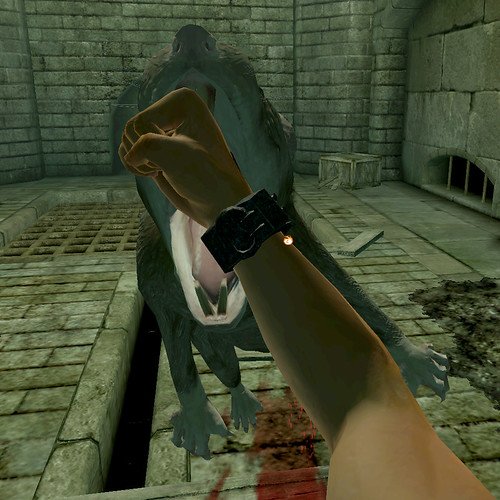
Tomorrow: snow, heroism, lightning and abdominal pain!
iPwn

I can honestly say that if I was going to spend SIX HUNDRED DOLLARS on a phone, I’d probably plump for this one.
All the quicktours there are worth watching, but my favourite thing rolled past in a still image that I can no longer find: ‘Slide to unlock’. A little place-marker on slider bar. I get the feeling this thing is going to seem a lot more futuristic and exciting once you get to use it.
If I didn’t know any better I’d be looking forward to what other people are going to do in response to this – how more affordable touch-screens or even just smarter interfaces will now take it upon themselves to also achieve such far-future concepts as scrolling to someone who’s name begins with m in under half an hour. But I have a feeling I won’t be able to enjoy such luxuries without snacking on the poison Apple – and paying SIX HUNDRED DOLLARS for the privelege – at any point in the next couple of years.
So I’d be happy enough if my 10MB phone was capable of storing more than FIVE KILOBYTES of text messages. I mean, proportionally that’s a considerable upgrade from the one kilobyte my last one had, but I’m not really feeling the ten thousand times more breathing room yet. I’d probably spring the SIX HUNDRED DOLLARS if I really thought Apple were design geniuses, but doesn’t it feel more like the only other people getting these things made are agonisingly, unspeakably dumb? I’m holding out for the day someone who isn’t evil gets a brain and a budget in the same lifetime, at least until the incompetent and malicious drop their prices a bit.
2006
Mine ended with a series of four quite different parties:

The Future Christmas Party, in the same vacant museum as last year, added dodgems and face-painting to the de-facto chocolate fountain for entertainment. The theme was apres ski, which most people quite reasonably refused to acknowledge. What I usually love about Future parties is just walking across the room and talking to everyone I know on the way, which typically takes around an hour. Socialising progressively shuts down the rational parts of my brain, so after about ten minutes of talking to any one person, my mind is completely empty and I a) say nothing at all if sober, or b) say something absolutely terrible if drunk. So drive-by conversations with lots of different people in a short space of time give me the pleasure of being friendly with people without becoming too much of an idiot.
I suffer chronic schizophrenia, pathological mendacity and anterior-grade memory loss when drunk, which almost cancel one another other out: I don’t recall what a blithering prick I was, and I don’t want to. Only tee-totallers, elephant-drunks and digital cameras put a spanner in the works.
Despite the lavish accoutrements, it was my least favourite Future party so far. If I’m not in the mood for these things I almost always am once I get there, but this time I just felt like curling up in a dark place with something that made sense. Parties, people and dodgems do not, to my mind, make any kind of sense.

Large fluffy penguins do, to be sure. This is Peng, given to my by Clare – ahem, a mystery Secret Santa benefactor – and he is an entirely logical creature. This was at a Christmas dinner party with The Other Circle Of Friends For Whom I Have No Convenient Name. Most people there were drunker than I have ever seen them, which in some cases is a very good thing and in others is not. In my case it isn’t, but luckily I didn’t pass my Threshold Beyond Which I Am Insufferable. I was residually drunk the next morning, though, and carrying my penguin home through town in that state was dreamlike and rather wonderful. One in every two people I passed commented, pointed, laughed or performed some combination of the three. My route home actually involved a leisurely stop at Caffe Nero for breakfast, leisurely enough to then stop at the Jazz Café for lunch with Craig and Graham, both on their way to a flight back to Mother Scotland.
Interesting coincidence: the other day I’d just emptied everything superfluous out of my wallet except my Caffe Nero loyalty card, which I hadn’t used in seven years but which has been modified to read, simply, NERD. Something to bear in mind the next time you empty everything superfluous out of your wallet including your Caffe Nero loyalty card, then the next day find yourself in Caffe Nero for the first time in seven years, and are tempted to say “Isn’t it always the way?” Sometimes it is the other way.
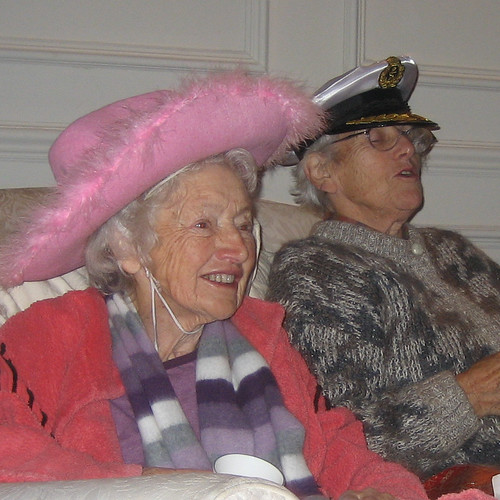
The family Christmas, involving easily as many silly hats per person as the Future party. In fact my parents now have a stock of them to distribute to anyone who wasn’t specifically given one. I was surprised and moderately saddened to find quite a few people were dreading their own family Christmasses – I’m lucky enough to have a family who spend more time laughing than arguing at any given gathering.
We played the 3D equivalent of the drawing game in plastecine, table football, an Indian puck-flicking game, and kazoos. I gave people mostly edible or non-corporeal presents: home-made bread, special foods from Bath’s many special-food shops, a mango orchard for Indian farmers. I got a huge number of diverse things, from smart clothes from the pictured grandmothers, juggling balls with a klutz’s guide, a DVD writer, a tabletop pool table, a power-drill and a present I’m easily geeky enough to need but not nearly geeky enough to buy: day-of-the-week-specific socks. I’ve always felt there must be a more civilised manner of determining which of the countless identical black socks have been worn since they were last washed than the crude olfactory method.

New Year’s, last night, here at my house. It was a dark and stormy night. That is a mini-fogger – a Christmas present – inside an extremely sensibly proportioned mug – also a Christmas present – adding ambience to my already pretty freaking ambient kitchen. Interesting coincidence: two days after I reflected that one of the few things not to go wrong with my house for some time was the bulbs, three bulbs broke in one afternoon. The consensus of party attendees is that the storm, or a surge in power usage on that night of the year, was causing this to happen a lot.
I came to the conclusion this morning that I should just stop talking altogether. I don’t think I said anything of worth in 2006, and if people really need to communicate with me there’s always e-mail. Everything I say aloud I regret, and quite often my brain just loses interest mid-sentence and I find entirely the wrong words inserted towards the end. I think last night I announced to the room that always have trouble keeping everyone “fed with water” when I host parties. I seemed to be trying not to say “drunk”, when in fact that was precisely what I was trying to say.
I’m told I should talk slower – someone who doesn’t know me very well apparently said that I appear to be trying and failing to keep up with my thought-speed, but to me it feels like I’m thinking too slowly. Whatever the temporal disconnect, it’s circumvented entirely in text, and I really like writing and even reading what I’ve written. Particularly after an evening of almost entirely failing to talk coherently. Interesting aside: in case you missed the link in my sidebar a while back, the creator of Dilbert has a fascinating speech disorder that means he can still speak in front of huge crowds, which is part of what he does these days, but is incapable of talking in normal conversation. More interesting still, he may have found a way to cure himself – something no-one with it has done before.
And So
The year! A great one, though much more erratic than previous ones. It had a long series of incredible highlights, each of which will I’ll recount in its own post this week, but an unwelcome temporary change in my job description meant I spent quite a lot of time with an unpleasant drowning sensation. It was to manage something I don’t like even when it’s done well, and doing it well calls for precisely the skills I don’t have. I’m told I did a good job, but it never felt like it. But yes, more than made up for by many completely wonderful events and happenstances. MORE ON THOSE PLEASE TOM.
My major achievement for the year was to finally settle a matter I’ve been dithering about for at least six years: lots of stubble and crazy hair, or short stubble and short hair? The first probably sounds better on paper, but after extensively studying documentary evidence from parties and photo-shoots, the latter is the clear winner. It will never be long again. I’ve also lost weight and girth and gained muscle and stamina, and since that accounts for thirty-two percent of all New Year’s Resolutions I will impart the secret: exercise more and eat less bad stuff. It’s the secret fitness plan they didn’t want you to know. Seriously, instead of not doing it, do it.
I don’t make New Year’s Resolutions specifically – I make around three resolutions every day, so technically I did make some on New Year’s Eve, but they weren’t special ones. Shutting up was a big one, I guess. Another is to find an application that will pop up an innocuous reminder every forty minutes or so to tell me to get up and walk around a bit. The experts who say you should do this if you use a computer a lot probably know more about RSI than I do, and I don’t have it yet, so I should do what they say I should do to prevent it. And instead of saying this and not doing it, I’m going to actually do it. I’m also going to buy a lot of clothes that I like. I now know for sure which of my clothes I like a lot, and discover that it’s not enough. I loathe clothes shopping, but I’m going to bite the bullet… this month, I’ve just decided.
Stuff Of The Year!
This is so easy.
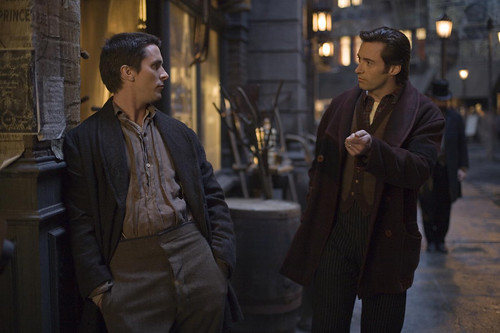
Best Film Of 2006: The Prestige. A period drama about two rival magicians, Hugh Jackman a masterful showman, and Christian Bale a gruff but ingenious trickster. It has a series of major twists, each of which you’ll see coming to varying degrees. But it’s not a film that needs to rely on the element of surprise to captivate you: one twist in particular is so chilling, so hauntingly macabre that working it out ahead of time is as enthralling as the grand reveal itself. Aside from that much of the fun, and screentime, comes from the vicious sabotage they commit on each other’s acts, starting with humiliating pranks and scaling steadily up to mutiliation and attempted murder. Link is to the trailer, and down the sidebar of that page you’ll find a three-part interview with Jackman and Bale, of particular interest to the ladies and gays since they are both freakishly, freakishly pretty men.

Best Song Of 2006: Cat Power – Willie. By a country mile. The entire album is a bassy, brassy, bluesy joy, so completely unexpected from the meek, stage-terrified front-woman Chan. It’s also album of the year, perhaps only by an urban mile, but this song is just… I don’t need to tell you anything about the song because I’ve uploaded it and you can download it and listen to it immediately, so I’ll stick to my New Year’s Resolution and shut up.
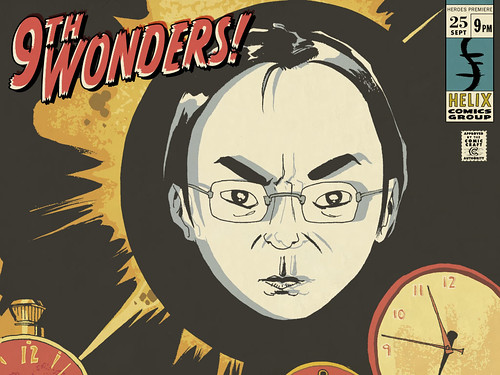
Best TV Show Of 2006: Heroes. Studio 60 is better written by a factor of seventy-one, Dexter is cleverer and 24 is more fun, but I’m all about the peaks. There have been moments in Heroes – many – at which I’ve wanted to know what happens next more than I’ve ever wanted to know anything about a TV show. When it comes together it’s in a league of its own, and it fills me with a warm substance I can only assume is glee.
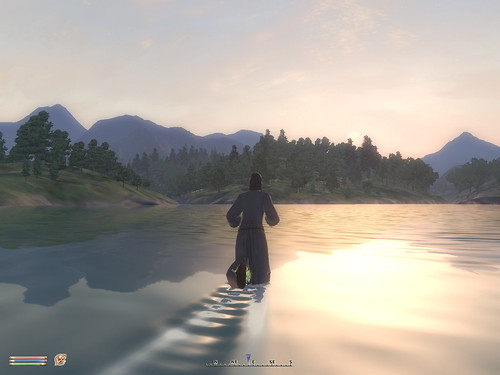
Best Game Of 2006: Oblivion! Oh, you think? You think the thing I named as the best game of all time in the PC Gamer Top 100 might also have been the best one this year? You think maybe the game I’ve written forty pages about in print magazines, and a few thousand words more online, might be my kind of thing? Did the 93% give it away? I’d love to be a little bit different to the dozens of lists agreeing with me right now and name Hitman or DEFCON, but no. By a country – and I may have used this term already in this post, but it’s warranted – by a country freaking mile, it is the majestic, sumptuous, liberating joy of Oblivion.
Primer

I use Amazon.co.uk’s DVD rental-by-post thing, which is one where you can keep the DVD as long as you like while you’re subscribed. This is good because they can’t have Primer back yet. After watching it, I spent forty minutes reading Wikipedia’s superb dissection of the film’s nine distinct timelines, featuring eleven iterations of the two main characters and a flow chart, then I watched it again with the director’s commentary on. Then I watched it again. Craig raises the objection that something ought to be comprehensible to the human mind on first viewing, and it’s true that this is not. I have a certain amount of time for enjoyably dumb films, but to me this is what entertainment should be: something beyond you, not pandering to you, something that both needs and deserves to be explored and understood.
It’s written by, directed by, produced by, scored by, edited by, partly filmed by and stars a former engineer who’d never written, directed, produced, scored, edited, partly filmed or acted in a film before, for $7,000, with a crew of six and only one trained actor. Its creator’s mum and dad supplied the food. And after watching it, you have to wonder why anyone needs more than that to make a film that doesn’t call for any particular special effects, because none of it really shows. It’s set in real locations which are free and appropriate, mostly with available light which makes it look realistic, and most of the people are people rather than actors, which makes them more convincing because actors don’t act like people anyway. It took two-hundred and fifty-six people and five million dollars to make Memento, a similarly stark and intricate film, and I’m not sure why.
It helps that Primer is about a couple of hi-tech engineers who run a tiny electronics business from their garages on top of their day jobs. In case the thing about timelines earlier didn’t give it away, it’s about time-travel. But it’s unique among time-travel movies in being almost entirely convincing, in about three ways:
1. If time-travel is ever discovered, it will be discovered like this. In Primer it’s a side-effect of a tweaked version of an existing type of machine, and they almost don’t notice it does it. It’s only by chance that one of them stumbles across the fact that the Weeble whose weight they’ve been successfully reducing has accumulated six years’ worth of mildew in its brief time inside. A long and quite slow-moving chunk of the film leads up to this in a very natural way, and the cautious excitement of intelligent nerds making something work is so well-invoked that I found myself quite thrilled when just they got this high-temperature superconductor to work at all, let alone travel through time.
2. This actually makes sense. It effortlessly explains all three usual objections to time-travel scenarios: a) Why haven’t we seen travellers from the future already? The furthest these machines can take you back is to the moment you switched them on. b) Why don’t you appear in empty space when you come out in your destination time, given that your starting point was elsewhere on the Earth’s orbit? You stay physically within these machines as you travel back in time, and you do travel back in time rather than teleport to a specific earlier point: you live backwards in the box while the rest of the world lives forwards. And c) Whatever you do in the past will already have been done in the past, removing the reason for you to have gone back in the first-place. Here, changing the past changes the past of the timeline you’re now in, which is no longer the same as the one you came from. It’s still useful because you can live in this new one, and your self here is planning on getting in a time-travel box which will remove him from it.
3. It’s not glamourous. They don’t whoop and jump around the room when it works. There’s no montage where they win the lottery and get drunk. It’s a hard, weird process to go back: you have to spend as much time as you want to travel inside an argon-flooded coffin, and there are side-effects. These guys try it for six hours a day, make measured profits on the stock market, and carefully isolate themselves from their contemporary dupes.
The plot itself is focussed exclusively on the use of these devices and the relationship between the friends who invented them. There are wives, children, friends and an outside character who plays an enormously important role later on, but none of them get more than a minute of screentime, and we never even find out why the outside character does what he does – simply because the two friends themselves don’t either. That level of focus is essential to detail the incredibly dense web of events that unfold over just a few days of traditional time, and probably only a week or so from the perspective of the most time-travelled character (whose identity would be a huge spoiler at this point).
Not Everything You Find On Flickr Makes A Lot Of Sense Right Away

The Everyone’s Photos page is the best place on the internet.
Posts About Games Writing Suck So I’m Writing A Post About Posts About Games Writing
I’m not partaking of the upsurge of inter-linked So You Want To Be A Games Journalist pieces that the awfulness of this one has caused, I guess because I see its two main offputting features as its self-indulgent subject matter and mind-boggling length. I haven’t read it, will never read it, but in attempting to find the URL for that link I caught myself ingesting a few sentences, and the gag-impulse to vomit a correction or mockery was violent. Despite over-writing pathologically myself, my favourite internet acronym – one I think is an enormously powerful positive force towards better writing – is tl;dr. If I ever feel in a position to lecture you on how to be more like me, please ignore me. And if I feel an article you weren’t going to read anyway demands a parody that is almost as long and requires you to read the tedious original to appreciate, restrain me. But if it occurs to me that a particularly catchy Jeffrey Lewis song is appropriate, please accept it into your hard drive.
The appropriate response to something foul is not to ingest it. If you already have, it is more polite to regurgitate privately, into a bucket.